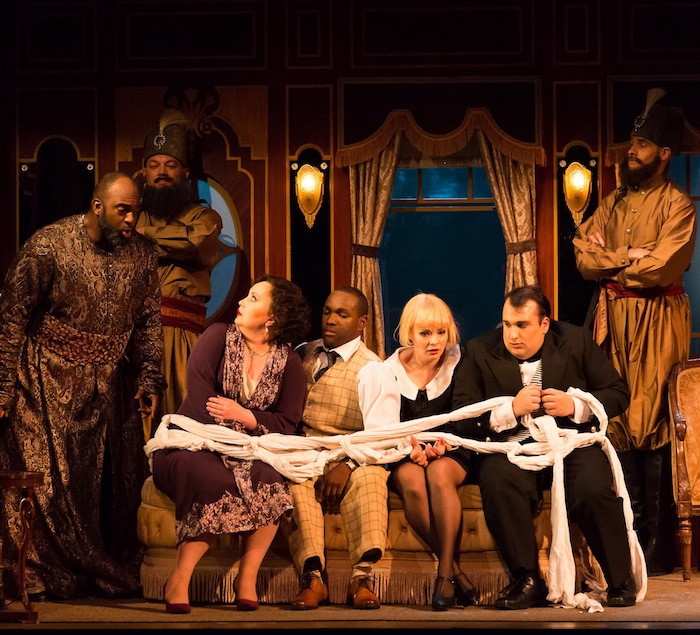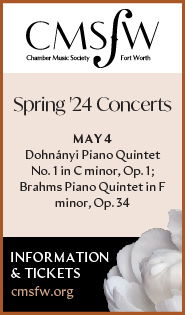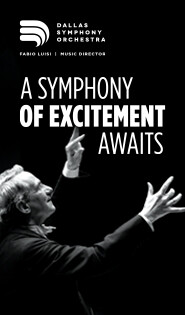Houston Grand Opera’s “Abduction” takes a ride on the Orient Express

Mozart’s “The Abduction from the Seraglio” opened Friday night at Houston Grand Opera with (from left) Ryan Speedo Green, Albina Shagimuratova, Lawrence Brownlee, Uliana Alexyuk and Chris Bozeka). Photo: Lynn Lane
Does loading The Abduction from the Seraglio onto the Orient Express accomplish much? Not that I can see.
James Robinson’s 2002 staging, revived Friday by Houston Grand Opera, transplants Mozart’s rescue opera to the legendary luxury train ofthe 1920s. Pasha Selim and his retinue — including the captive Europeans Konstanze, Blonde and Pedrillo — are traveling from Istanbul to Paris. Konstanze’s intrepid sweetheart, Belmonte, slips onboard in hopes of spiriting away her and her fellow prisoners.
The entire adventure unfolds on the train, and designer Allen Moyer has supplied a couple of handsomely furnished rail cars. The pasha and Konstanze are decked out in elegant 1920s attire, courtesy of costume designer Anna R. Oliver; Belmonte, for most of the opera, sports a snappy windowpane-plaid suit.
Naturally, director Robinson avails the show of the updated setting’s potential for stage business. Belmont lights a cigarette as he ponders his situation. The pasha plies Konstanze with champagne, sweets, a floor-length fur coat and other finery in the attempt to win her affection. Blonde does a little ironing during a scene with Osmin, who of course examines the iron to comic effect.
Still, Robinson builds this into a lively show. Other than making the pasha a Europhile, the new setting brings nothing new to Mozart’s story. And by opera-house standards, the rail cars eventually feel claustrophobic: From their ceilings up, the stage is masked, offering the audience only a giant map of the Orient Express’ route. The stage looks like the operatic version of a severely letterboxed movie on TV.
Mozart’s music also seemed boxed-in on Friday. Only two of the singers really captured the score’s emotional and comic impact: Albina Shagimuratova as Konstanze, on the dramatic side, and Ryan Speedo Green as Osmin with the antics.
Shagimuratova brought such gleam, agility and impact to the blockbuster aria “Martern aller Arten” that it showcased not only her vocal heft, but Konstanze’s indomitable resolve. Shagimuratova’s finesse enabled her to savor the soulful lyricism of “Traurigkeit” — abeted by conductor Thomas Rösner, who made room for the vocal line and the orchestra’s weighty punctuation to register equally.
Green reveled in Osmin’s bluster. Admittedly, Green didn’t treat the role to a genuine basso profundo voice, and his lowest notes were barely audible. But he boomed and bellowed with glee and cut an imposing figure, towering over everyone else in the cast. When Osmin raged at full tilt, his storming and flailing swallowed up so much space that the rail cars could barely contain him.
In the speaking role of the pasha, Christopher Purves — switching over from his concurrent role as a compelling Alberich in HGO’s Götterdämmerung — exuded power through his calm, confident bearing. Thanks perhaps to his Wagnerian experience, Purves sounded most at home of anyone in the cast with the German dialogue. (And he also looked as if, with a little moustache adjustment, he could slip right into the role of Hercule Poirot in that other Orient Express drama.)
The other principals had their strengths, but none of them projected so vividly. Tenor Lawrence Brownlee brought lyricism and clarity to Belmonte’s music, but not much poetry or fervor. Whenever he sang alongside Shagimuratova, his voice sounded a couple of notches too small.
Tenor Chris Bozeka sang gracefully as Pedrillo, especially in his little serenade. But his voice was also on the small side — except for a couple of ringing high notes that very effectively energized Pedrillo’s mock-militant “Frisch zum Kampfe.” Soprano Uliana Alexyuk sounded ill-at-ease in Blonde’s first aria — unsteady in pitch and tentative with scales. She sang more securely and perkily thereafter.
Rösner molded Mozart’s lyricism with Shagimuratova’s arias, and led the Houston Grand Opera Orchestra in a bright, speedy performances of Mozart’s score. Sometimes the orchestra was nearly too airy to register in Wortham Theater Center’s capacious Brown Theater. Though considering the predominantly light voices on stage that was probably a blessing.


